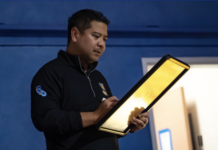
Assistant coach Andrew Basler has been a part of the devoted coaching staff here at UCR track and field since 2007. Basler coaches sprints, hurdles, long-jump athletes along with combined-event athletes. Basler brings tons of experience having been a collegiate athlete himself at the University of Wisconsin, La Crosse, where he majored in art. Basler succeeded on and off the field, having been recognized for both his academic achievements and winning accolades on the field.
“I entered college as a long jumper, high hurdler and javelin thrower. During my third-year, I started competing in the decathlon. By the time my fifth-year of competition came around, I concentrated strictly on long jump. I ended my collegiate career as a three-time All-American (including an individual national championship in long jump) and part of four team national championships. On the academic side of being a student-athlete, I served as president of my school’s and conference’s Student-Athlete Advisory Committee. Due to my success on the track and in the classroom, I was fortunate enough to be a five-time Academic All-American,” recalled Coach Basler.
After graduating from the University of Wisconsin, Basler went to Central Michigan University to get a master’s degree in sports administration and was an assistant coach for the women’s track and field program there. After graduating, Basler came out west to UC Riverside.
“My two year graduate assistantship at Central Michigan University was ending so I was searching for a full-time coaching position. I interviewed at Eastern Michigan University, George Mason University, and here at UC Riverside. I felt that UC Riverside offered me the best potential to grow as a coach,” explained Coach Basler.
Spending most of his career in the Midwest, Basler noticed a significant difference in the track and field culture between the Midwest and Southern California.
“I think there are a few differences between the track culture in the Midwest as compared to Southern California. The level of talent out of high school can be comparable, but Southern California has so much more of it because of its population. I think the geographical difference is apparent in the overall work ethic of high schoolers. I think since the majority of the Midwest is rural, kids learn the value of hard work from working on farms. Since Southern California is so urban and everything seems so ‘fast’ high schoolers out here don’t have the opportunity to learn the value of hard work as readily as Midwestern kids. This translates on the track when kids expect fast times and far distances without putting in the necessary work in their life to achieve their goals,” explained Coach Basler.
Basler’s experience as a collegiate athlete has helped him in his coaching career. His coaching success includes two athletes who took part at the 2008 US Olympic Trial Qualifiers, and this year, long jumper Ted Hooper placed first in league at the 2012 Big West championships. Basler draws from his experience with his interactions with his former coaches when he was an student athlete.
“I was blessed to have great collegiate coaches who were passionate about the sport and worked hard to make sure us athletes received the best student-athlete experience possible. Experiencing that as an athlete really helped shape how I coach and mentor my own athletes. The level of success I experienced individually and as a team during my collegiate career made me realize that I have that winning drive as a coach. I want my athletes to experience that level of success because I know how good it felt for me as an athlete” said Coach Basler.
Basler got into coaching because teaching has been his passion since bring in grade school. While looking to pursue a career in the arts, Basler did not find it as his niche, and changed course into coaching, bringing him back into his natural habitat, the track.
“I have always wanted teach/coach ever since I was in grade school. When I graduated college with my bachelor’s degree in art, I went on to work toward my master of fine arts degree. While art was very competitive, my success was based on people’s opinions. It was very subjective and as a former track athlete, that was very frustrating. I was used to getting measured more objectively with times and distances. As a result, I got out of the field of art and pursued a coaching career in track” said Coach Basler.
Basler hopes his athletes learn to apply his teachings and apply it not just athletics-wise, but also to other parts of their lives. He explains, “I hope my athletes take away the value of hard work, the importance of process, and benefit of having a positive attitude. The technical training I provide them will allow them to find short-term athletic success. But when the track spikes get hung up, I hope that the underlying values I possess as a coach and try to teach them will help them be successful throughout their lives.”








